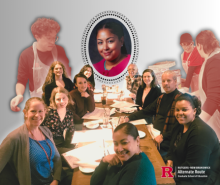Management Tips for Those New to a Classroom

In New Jersey, thousands of people receive their teaching certificates every year, which means rookie teachers are never alone.
The teaching candidates who have gone through the Rutgers Alternate Route program know that tips and strong mentors help fill the experience gaps. These are especially helpful as new teachers get to know their students better and learn the classroom’s personality.
“In my first year of teaching, I have found that my best resource has been my fellow teachers,” Jonathan Jaronczyk told Rutgers Alternate Route in 2017. “I have relied on them for student planning ideas, classroom management techniques, and overall learning about school culture.”
First-year teachers face a significant learning curve, and other educators play a role in helping their colleagues get up to speed. As they go through the program, Rutgers Alternate Route teachers share insights from their journeys, with that information passed down to future candidates.
Tips from the Rutgers Alternate Route candidates
The following tips highlight how common many challenges are for new teachers, as well as solution options to try in the classroom. This insight helps other soon-to-be teachers breathe a sigh of relief as they step into their field.
Prepare
“Make sure everything is ready ahead of time, be more mobile, and practice prior to class.”
-Andrew Berger, Chemistry
“The most valuable takeaway was the importance of developing a comprehensive lesson plan. By taking the time to write a detailed plan, I made the lesson content more memorable for the students. I also enhanced the fun aspect of the lesson by investing a lot of time in the planning stage. As mentioned above, I also learned that I need to allow more time for most components of my lesson, especially the events that entail physical activity/relocation and guided practice.”
-Scott Aiello, Elementary School
“It is my first year really learning about how to plan. There is so much to consider when planning for the first time, it seems really overwhelming. I think the best idea is to stick to a basic format and make small changes as I go when necessary. Each time I do have trouble planning I can always ask a fellow teacher or now revisit all the information we have been given in this course.
-Andrew Tencza, High School
“I over-planned for this period, but I think I would rather err on the side of over-planning. Still having the expectations that we would get through four activities created a little anxiety for me and made me feel rushed, so I think in the future I might just drill down on fewer activities so that we can all take our time and enjoy what we're doing!”
-Shannon Vasile, Elementary School
Get to know students
“I learned that it is really important to know the language level of the students, which may differ even though they might be in the same grade.”
-Gul Conger., ESL
“This experience taught me the importance of connecting students’ interests. There were definitely moments during the lesson that were heavily information-based, and I could see the students starting to drift out of engagement. It will be a challenge to maintain a constantly engaging classroom, but I know that it is essential in order to be highly effective as a teacher.”
-Cara McGrady, English
Be realistic about pacing
“I learned that I need to be more realistic about the pacing of lessons and allow extra time for questions and/or comments.”
-Angela Girardi., Elementary
“Things moved a bit faster than planned and I need to anticipate changes and have insight into how long things will take. Also, I need to have a very detailed pathway that is easily visible to make sure I'm keeping everyone on track. This practice lesson was a big help and I found that the lesson planning and delivery sheet were much more helpful than anticipated.”
-Matthew Della Vecchi, Elementary Education
Be flexible and have a backup plan
“I learned the importance of being able to pivot and having a backup plan. The students were not able to move to group work/guided practice as quickly as I anticipated, so I extended the time we spent working together and, when they were ready to move to the group work, lowered the number of examples I asked them to locate in the text.”
-Breanne Long, English
Incorproate visuals
“I learned that charts and images help students comprehend topics in science. I also learned that asking questions helped keep students engaged.”
-Ayesha Zaman, Biological Science
“Students are more willing to participate if they can interact with you and the resources/tools being used. The sign-language video was a big hit with the students because they got to sing and learn the letters. I should include more interactive things in my lesson to help all my students learn better.”
-Neha Makwana., Elementary
“While writing and listening are important, including hands-on activities is also beneficial. Also, viewing current videos and tying them in with a lesson activity bolsters learning. Students love it when technology is included in the form of a film.”
-Marcia G., Spanish
Keep the energy up and lesson plans diverse
“I learned that no matter the subject, I need to keep the energy upbeat and keep children engaged using different tools and strategies. I also learned that it can be beneficial to the lesson to let students give input and ideas, even if it was not outlined in the plan.”
-Camille W., Elementary
“With a higher-level class, I would need to adjust the standards, as well as make the lesson a little more differentiated. I could include a video to engage with guided questions. I could have also included partner or group work more. I also need to have both hard and electronic copies of the necessary information for the class in the future to avoid setbacks with technology.”
-Cameron Cobb, Social Studies
Refer to your toolkit
“The methods from the teacher toolkit are incredibly helpful, as well as the ability to watch myself in a recorded setting. It is far more effective to be able to watch myself make mistakes and assess how I can improve rather than trying to recall a flaw in a completed lesson from memory.”
-Maria C., Elementary
Have clear expectations
“Students feel safer and confident when the expectations are clearly given to them. What I learned from this experience is that even when the assignment is simple, expectations and procedures should be very detailed.”
-Nilgun A., Theater
“Student-centered independent learning requires a well-managed classroom with clear routines, rules and consequences. Lessons like this are stronger when developed with backwards design and knowing the end goal/ project to a unit of content.”
-Catherine Gardner, Technology Education
Remember that all students learn and work differently
“One thing I learned is that all students learn and work at a different pace. It is okay to allow certain students extra time to complete certain assignments, not all students should be expected to work at the same pace."
-Christina D., ESL
“I learned creative ways to involve students who may have different levels of ability, by spotting which students may be lost and asking for their opinions, or finding ways to involve students who may have trouble focusing.”
-Kelly, English
A new program that simplifies the transition to becoming a full-time teacher
A new program recognizes how important classroom experience is and leverages school support professionals already doing the work.
ParaPreppED, an NJDOE-funded teacher apprenticeship initiative, has leveraged that on-the-job learning to help districts grow their teaching pool. The program makes becoming a certified teacher accessible to those who already hold a four-year degree. Emphasizing training on the job helps teaching candidates make the most of their time while receiving quality education and mentorship.
Overall, the program aims to:
- Increase the number of Registered Teacher Apprenticeships in the state;
- Expand the teacher pipeline, leveraging the existing district talent;
- Address barriers for aspiring teachers through targeted support like Praxis prep; and
- Conduct and disseminate ongoing research on the implementation and impact of the initiative.
ParaPreppED is driven by the expressed interests of district leaders who wish to identify overlooked or hidden teaching talent among eligible paraprofessionals and substitutes the district can support to fill teaching vacancies, including those in Special Education, Science and Math, and English as a Second Language or Bilingual Education.
If you’re considering following your dream of teaching, Rutgers Alternate Route can offer you the support and training you need to succeed. Be sure to follow Rutgers Alternate Route on Twitter and sign up for Alternate Route’s monthly newsletter for more information and stories from the field of education.

 Heather Ngoma has over 25 years of experience collaborating with educators across New Jersey to drive education innovation. She currently serves as the Director of the Rutgers-GSE Alternate Route Program in the Department of Learning and Teaching, a program which helps career changers, recent college graduates, and other aspiring education professionals become licensed teachers in New Jersey. Follow her on Twitter @heatherngoma.
Heather Ngoma has over 25 years of experience collaborating with educators across New Jersey to drive education innovation. She currently serves as the Director of the Rutgers-GSE Alternate Route Program in the Department of Learning and Teaching, a program which helps career changers, recent college graduates, and other aspiring education professionals become licensed teachers in New Jersey. Follow her on Twitter @heatherngoma.





